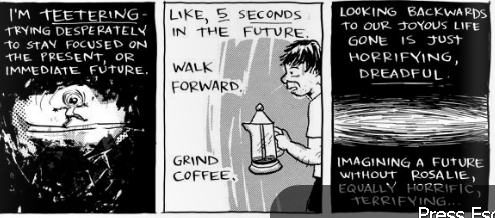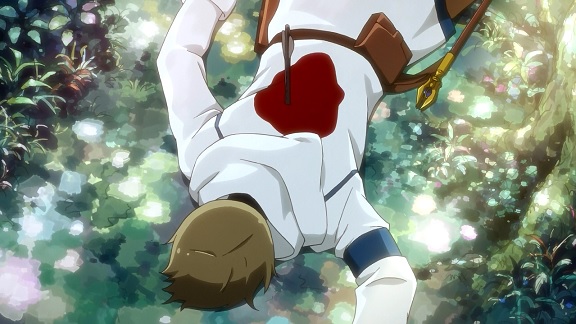
Hai to Gensou no Grimgar is the story of a party of (what we presume to be) amnesiac gamers trapped in a fantasty world and drafted in what’s essentially a race war against goblins and other monsters if they want to survive. And they’re not the ‘leet kind of gamers either, but rather the ones left over after all the capable people banded together and left them. inexperienced and incompetent at first, what keeps them together and alive is Manato, their leader and healer-priest. The heart and the soul of the team, he’s too good to be true and therefore keeps raising death flags for himself all through the first three episodes, particularly because he keeps going into the thick of battle and healing everybody the moment they get as much of a scratch. In episode four his flags come due, as the party attempts an ambush of a small group of goblins, they’re ambushed themselves instead. As they retreat Manato is shot in the back by a goblin archer, who deliberately aimed at a spot he can’t reach so he can’t heal himself, dying as the party reaches safety.
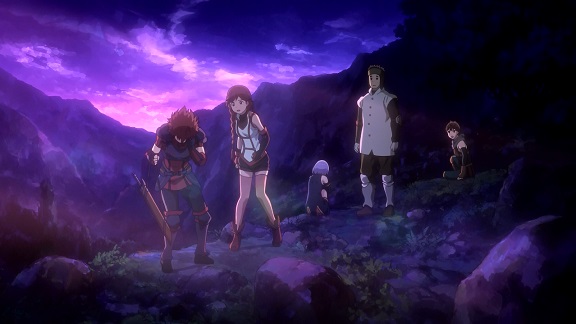
In a matter of minutes the party has lost their leader and friend, something which doesn’t fully sink in until they bring his body to the temple he was a priest of and heard the head priest officially pronounce his death. Unlike the audience, they didn’t see it coming, couldn’t prepare for it and therefore their grief is raw and sudden. At first there’s anger and denial, a refusal to believe he really is dead and it is only after they were forced to cremate him (so he wouldn’t turn into a zombie), that anger makes way for a dull acceptance. The party is splintered, robbed off its heart, each of them alone and lonely and only capable of thinking of their own grief, something the opening scenes of episode five make painfully clear.
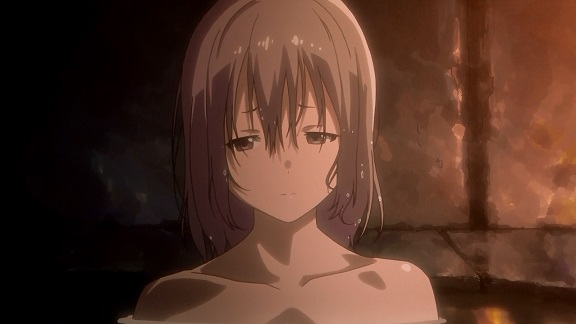
Shared grief often brings people together, but it helps if you can prepare yourself. In Grimgar‘s case, the death of Manato instead worsens the already bad relationship between the two girls in the party and the three remaining guys. Things had been wrong for some time already, but with Manato as mediator the differences and mistrust were papered over. With him gone, the men retreat to the pub while the women are left on their own, with the silver haired Shihoru especially taking his death hard, having only opened up to him just before his death, leaving Yume having to deal with both their grief with no support from anybody else. For long stretches in the episode they even disappear, the narration following the boys to the pub instead.
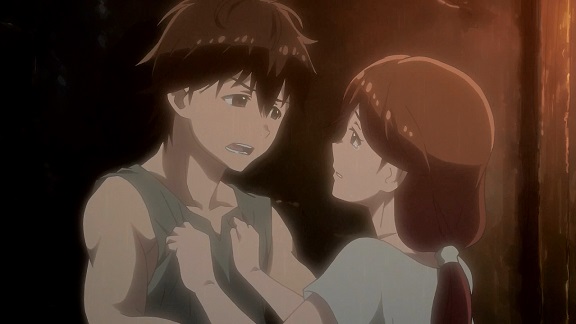
What makes Manato’s death especially hard to deal with is that it was avoidable: the party got caught up in its own hubris, became careless, took one too many risks. Manato himself wasn’t free from blame either, as his successor, Mary, makes clear. Brought in by Haruhiro only a day after Manato’s death, she’s a very different sort of healer: disinclined to fight in the front or heal every little scratch, prefering to keep her distance and save her strengths, something that’s objectively the better strategy. But it doesn’t make the guilt everybody feels about getting him killed easier to bear, nor does Haruhiro’s unilateral decision to replace him lessen the distance between him, Moguzo and Ranta on one side and the girls, Yume and Shihoru on the other. It’s only when he runs into Yume at their bathing house and for the first time several episodes actually sits to talk with her, that they start to heal and get some of their mutual trust back.
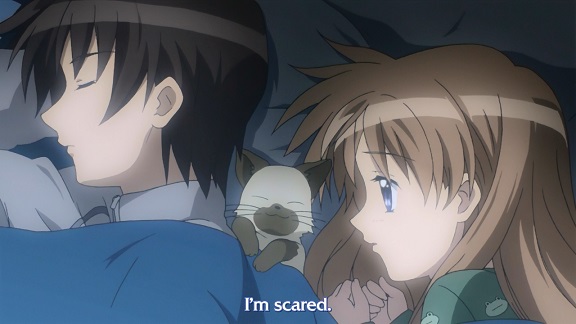
Because his death was so unexpected, because of existing tensions, grief in Grimgar hits hard and sharp, leaving the characters barely able to deal with it. Compare this with Kanon (2006), which also deals with grief, but of a sort we’re more likely to encounter than that of Grimgar: anticapatory grief, of knowing a loved one, a family member is terminally ill and will be dead soon. Most of us are more likely to die of an illness than by goblin arrow after all; most of us will have experienced such a death in the family at least once by the time we’re adults. Episodes eight and nine of Kanon feature one of the best portrayals of this kind of grief I’v seen, even if the illness causing it is of a mystic nature.
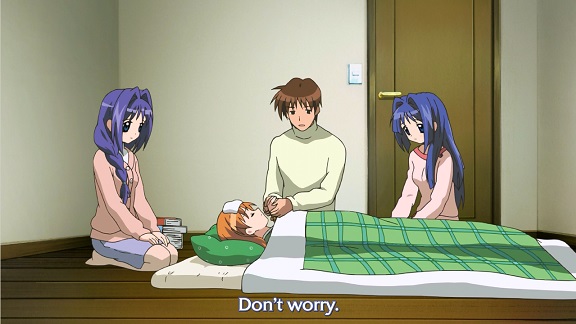
As you probably know if you’re into anime, Kanon is a Kyoto Animation adaptation of a Key visual novel, which together with several other of such adaptations they made their reputation as one of the best anime studios with. The story revolves around Yuichi Aizawa, coming back to town after seven years of absence to live with his cousin and aunt, running into various girls he used to be close to when he lived there before, having forgotten about them in the mean time, now rediscovering their relationships and solving their problems. One such girl is Makoto Sawatari, who attacks him for now reason one day as comes out of the supermarket and who he brings home when she collapses. Most of the interaction between her and Yuichi is fairly lighthearted and rather funny, until things get serious from episode seven onwards, as Makoto starts to forget how to be human. It turns out she’s a fox spirit who turned human out of a desire to be with Yuichi, knowning that her time would be limited.
In the next two episodes we see her regress more and more, with Yuichi abandoning school and everything else to be with her as much as possible, trying his hardest to make her happy in the few weeks or days they have left together, culminating in the “wedding” shown above. At the same time, as her condition worses, we sees his horizons narrow, as the time left to her turns from weeks into days into hours. It’s a familiar grief to me, having gone through much the same with Sandra, eleventh hour wedding and all, much more familiar than Grimgar‘s. Each in their own way succeeded in making me feel the reality of their grief without sinking into melodrama.
